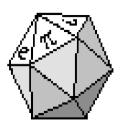Yahoo Answers is shutting down on May 4th, 2021 (Eastern Time) and beginning April 20th, 2021 (Eastern Time) the Yahoo Answers website will be in read-only mode. There will be no changes to other Yahoo properties or services, or your Yahoo account. You can find more information about the Yahoo Answers shutdown and how to download your data on this help page.
Trending News
prove any number bigger than 1 is prime if and only if it is not composite?
Prime(n) = (n>1) \[And] (\[ForAll]m.(m\[VerticalSeparator]n) ->(m=1) \[Or] (m=n))
Composite(n) = \[Exists]a,b.(a<n) \[And] (b<n) \[And] (n = a\[CenterDot]b)
(x\[VerticalSeparator]y) -> x<y
1. \[ForAll]n.[((n>1)\[And]Prime(n))->\[Not]Composite(n)]
2. \[ForAll]n.[((n>1)\[And]\[Not]Composite(n))->Prime(n)]
Ok just to clarify a little, this can NOT be proved by just plugging in numbers and showing that this is prime and that is composite. This has to be proved in mathematical (or rather logical) terminology. We are supposed to use The definitions included in the description ^^^ and show that
1. If n>1 and it is Prime, then it is NOT composite
2. If n>1 and is NOT composite, then it is Prime
Thanks guys
2 Answers
- MorewoodLv 710 years agoFavorite Answer
I think you need to look carefully at (m\[VerticalSeparator]n).
What does that mean to you (what is your definition)?
You wrote: (x\[VerticalSeparator]y) -> x<y
which seems odd given that (m\[VerticalSeparator]n) ->(m=1) \[Or] (m=n)).
I would think: (x\[VerticalSeparator]y) -> ( \[Exists]z. (y = x\[CenterDot]a) )
Exactly what definitions you have effects how your proof will look.
-----
But I really prefer doing proofs in plain English as much as possible:
If a number is prime, then it is larger than 1 and every proper divisor is 1. (That is your definition of "prime" in plain English.) So any two proper divisors have a product of 1×1=1, which is not equal to the number. Hence this number is not a product of two proper divisors. (A product of proper divisors is your definition of composite in plain English.) Therefore this number is not composite.
The other way is a little easier to prove as a contrapositive. Prove that if a number bigger than 1 is NOT prime (what does the definition say?), then it is compositive. This requires: m>1 -> n/m<n.



